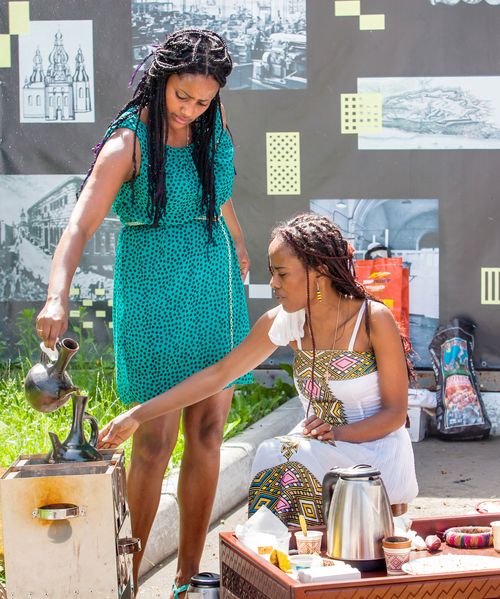“You can achieve everything in Ukraine!”
Migrants from various countries share their success stories at a charitable festival to mark World Refugee Day
A thin trickle of coffee is flowing from a finely-carved vessel. The beverage is poured into little bright cups. Visitors sit down on low stools and relish their coffee. This is a scene at a Mystetsky Arsenal festival as part of World Refuge Day celebrations on June 20. The event was organized by the UN Refugee Agency, volunteer organizations, and the Mystetsky Arsenal national culture, art and museum complex.
The Ethiopian-born Yirgu Dejene, who is showing Ukrainians a coffee ceremony, has been living in Ukraine since 1988. As Ethiopia is the home of coffee, Yirgu has launched a business based on this product. His firm deals with frying and selling coffee. “One should be calm while having coffee. People communicate slowly during the ceremony,” Yirgu Dejene says. “The same coffee is to be brewed three times. The first-brew drink, known as ‘abolina,’ is strong. As the coffee is brewed for the second time, water is added. At the third stage, some more coffee or, usually, only water is added. The third-brew beverage is weak, and even children can drink it.” The ceremony lasts for about an hour, with joss-sticks burning to drive away evil spirits.
“Having lived in Ukraine for almost 30 years, I can see much more freedom here,” Dejene points out. “I don’t mean the freedom of speech – I mean I can easily get what I want to. It is almost always possible in Ukraine, if you work. It is also important that I can properly bring up my children, even though there still are some economic problems. It is somewhat difficult to launch a new business for lack of a normal banking system. All the rest is good. Ukraine is a wonderful country, where one can achieve everything if he or she really strives to do so.”
The Mystetsky Arsenal festival displays the projects of not only foreign refugees, but also of internally displaced persons. For example, Anatolii Osadchy, Olena Bilous, and Anna Zhulavska, who moved from Donetsk to Kyiv in 2014, suggest that Ukrainians test their strength in a corn maze. Of course, you can’t possibly bring a two-hectare corn field to the festival, so the migrants explained their initiative and invited everybody to take part in a preparatory game. Their project “Labirudza” began to work last August.
“Corn mazes are extremely popular abroad – in the US, Canada, and Europe. And in Ukraine, we are the first to do so. We are trying to develop eco- and agro-tourism,” Bilous explains. “The most difficult thing for us in the past two years was to believe that it was happening in reality and that we must go on living in spite of the situation. If we only wait until we go home, we will never succeed here.”
Newspaper output №:
№40, (2016)Section
Time Out





